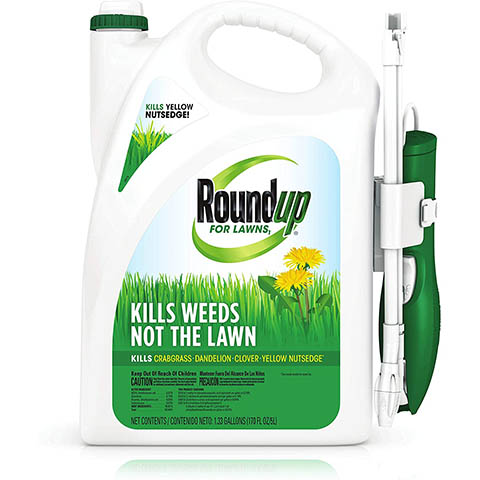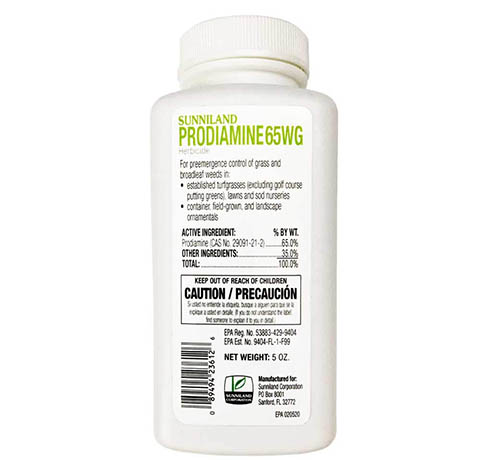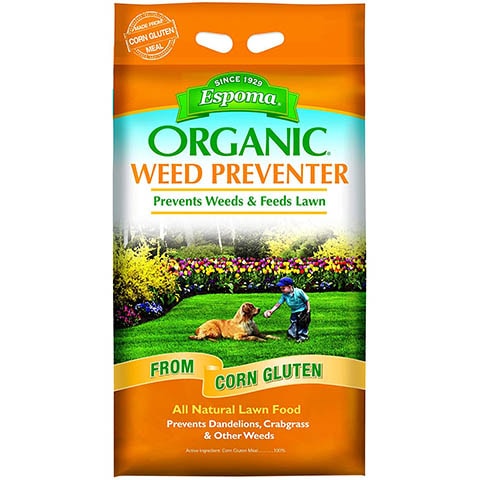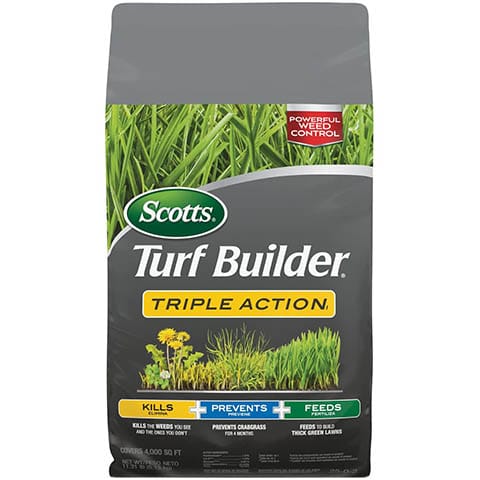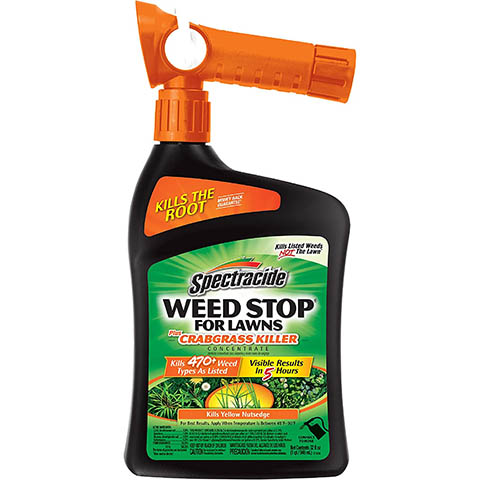7 Best Weed Killers that Won’t Kill Grass in 2025: Reviews & Top Picks
-
Kristin Hitchcock
- Last updated:
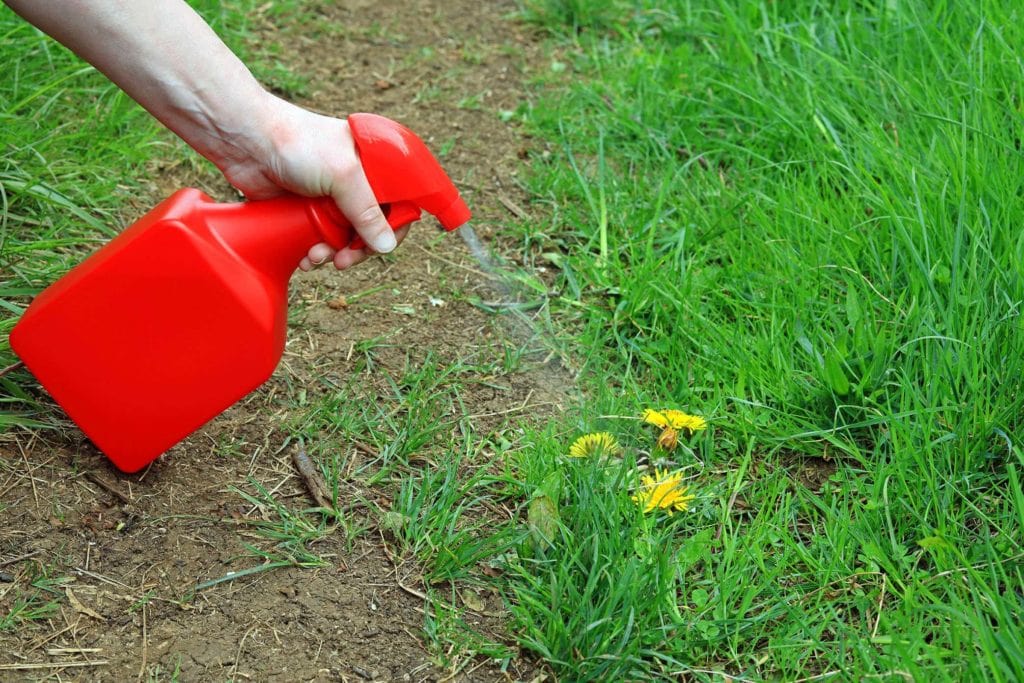
If you have a yard, you probably have weeds. While the exact kinds of weeds can vary, all weeds can crowd out your grass and other carpet plants. Plus, weeds tend to turn brown and die in the summer or winter, which can leave you with a big, brown yard.
If you’re trying to encourage your grass to grow, you must eliminate the weeds. Sadly, a weed killer that will not kill your grass is hard to come by. It doesn’t do you much good if you clear the weeds only to kill your grass in the process.
We searched high and low for weed killers that will not damage the grass. Below, you’ll find the reviews of our seven favorite weed killers with the lowest chance of harming your grass.
A Quick Look at Our Favorites in 2025
| Rating | Image | Product | Details | |
|---|---|---|---|---|
Best Overall

|
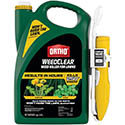
|
Ortho WeedClear Weed Killer for Lawns |
|
CHECK PRICE |
Best Value

|

|
Roundup for Lawns |
|
CHECK PRICE |
Premium Choice

|
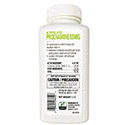
|
Yard Mastery Prodiamine 65 WDG |
|
CHECK PRICE |
|
|
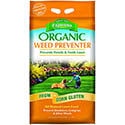
|
Espoma Weed Preventer |
|
CHECK PRICE |
|
|
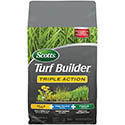
|
Scotts Turf Builder Triple Action |
|
CHECK PRICE |
The 7 Best Weed Killers that Won’t Kill Grass
1. Ortho WeedClear Weed Killer for Lawns – Best Overall
| Rainproof: | After 1 Hour |
| Spray Style: | Wand |
Out of all the weed killers, Ortho WeedClear Weed Killer for Lawns is easily the best overall weed killer that won’t kill grass. It is specifically designed to kill only broadleaf plants down to the root. Grass does not fall into this category, and it will come through undamaged. However, most weeds will be unable to withstand this weed killer.
Because it only kills broadleaf weeds, other weeds may not be affected, but Ortho targets hundreds, so the odds are that the weeds in your yard won’t stand a chance. It comes with an easy applicator wand that allows you to spot treat as necessary. While you can spray it over your whole lawn, spot treating is often more efficient and safer.
Plus, after an hour of rest, the formula is completely rainproof. You have to wait until spring or fall to apply this weed killer since it requires daytime temperatures of under 90 degrees.
- Kills most broadleaf plants
- Wand applicator
- Rainproof after one hour
- Kills weeds at the root
- Easy to spot-treat with
- Only targets some weeds
2. Roundup for Lawns – Best Value
| Rainproof: | After 3 Hours |
| Spray Style: | Wand |
Just about everyone knows what RoundUp is (for better or worse). It doesn’t get much better than Roundup for Lawns for those on a budget. As the name suggests, this Roundup is used next to the grass. However, it is only made to be used on northern grass and may not be too kind to southern grasses.
It starts to kill the weed down to the root as soon as it is applied. After 3 hours, it is entirely rainproof and will not wash away. Therefore, we recommend applying it on a clear and rain-free day. It kills a range of common weeds, including dandelions and clover.
Roundup comes with an applicator wand for spot treatments. To use it, all you have to do is insert the plug and twist the knob. While Roundup isn’t the safest option, it is cheaper than other brands. Therefore, it is the best week killer that won’t kill the grass for the money.
- Rainproof after 3 hours
- Wand applicator
- Targets most weeds
- Easy to use
- Only for use on northern grasses
3. Yard Mastery Prodiamine 65 WDG – Premium Choice
| Rainproof: | Right away |
| Spray Style: | Wand |
Yard Mastery Prodiamine 65 WDG is a premium weed killer typically used by professionals. However, this bottle is smaller and affordable for a DIYer looking for professional-quality products. As a concentrate, you have to add this mixture to water, so a separate sprayer is often recommended. One container of this concentrate treats a massive area, so don’t let the smaller size fool you.
In fact, this bottle is enough to treat 10,000 square feet for a year. This weed killer targets several weeds, including crabgrass. It is safe for all grass types, however. Therefore, it is one of the most effective options on the market that also won’t kill your grass.
To use it, you need to dilute it in water and then spray it across your yard. Treating in the spring and fall is recommended, and Yard Mastery will kill current weeds and prevent new ones from growing.
- Safe for all grass types
- Enough to treat 10,000 square feet
- Targets a variety of different weeds
- Smaller bottle for DIY use
- Must have a separate sprayer for application
4. Espoma Weed Preventer
| Rainproof: | Right away |
| Spray Style: | N/A |
We included Espoma Weed Preventer on this list because it is a safe weed killer and preventer. This formula works as a preventer and a fertilizer; it fertilizes your existing grass and prevents weeds from growing. It may even kill weeds that are already there.
However, children and pets can safely play on the lawn right after application, which cannot be said for most other weed killers. Therefore, it is a great option when safety is essential to you.
This formula is organic and made primarily from corn gluten meal. While there doesn’t seem to be anything insidious about it, it is quite effective at killing and preventing most weeds. This preventer cannot be used to spot treat. Instead, you’ll have to spread it across your whole yard, and you may end up paying more than you would for other weed killers.
- Fertilizes grass
- Discourages weeds from growing
- Safe for children and pets
- Organic
- Can be a bit more expensive
- Not useful for spot-treatments
5. Scotts Turf Builder Triple Action
| Rainproof: | After 24 hours |
| Spray Style: | N/A |
Scotts Turf Builder Triple Action prevents and kills weeds. It also helps fertilize grass and encourages a thick turf—hence the name. You can use it on grass or when planting the seed. It works on most common weeds, including clover, ground ivy, chickweed, and henbit. It prevents crabgrass for 4 months, so it is recommended that you reapply it in the fall and spring.
However, Scotts weed killer does not do a good job of killing crabgrass. Instead, it primarily works as a prevention formula. To use this fertilizer, you do need a fertilizer spreader. After you apply it, water after 24 hours for maximum effectiveness. One bag treats 4,000 square feet, which is less than other formulas. This fertilizer is an excellent option for those looking to prevent weeds.
- Prevents most common weeds
- Easy to apply
- Lasts for 4 months
- Doesn’t kill all weeds
- Requires a fertilizer spreader
6. Ortho WeedClear
| Rainproof: | After 1 Hour |
| Spray Style: | Sprayed with a hose |
Ortho Weedclear kills weeds down to the root. However, it will not harm most types of grasses. You should be able to see visible results within a few hours; that’s how fast it works. It targets hundreds of common weeds using three ingredients. Some of them work better for some weeds than others. Therefore, this formula includes many types of weed preventers so that it can work well on most weeds.
This formula is fast-acting. It eliminates weeds instantly and kills them down to the root so they will not regrow later. The spraying system makes it perfect for spot treatments, though you can also use it to treat your entire yard.
However, it needs cooler temperatures to work effectively, and you need to apply it in the spring and fall—not in the summer. In hot areas, the Ortho formula may not be very practical.
- Safe for many grass types
- Treats the entire lawn
- Kills 200 types of weeds
- Only suitable for some temperatures
- Can only treat 5,000 square feet
7. Spectracide Weed Stop for Lawns
| Rainproof: | After 6 Hours |
| Spray Style: | QuickFlip Sprayer |
Like most weedkillers on this list, Spectracide Weed Stop for Lawns is designed to kill weeds without destroying the grass. It kills more than 200 weeds, which should cover most of the weeds in your yard. Plus, it also controls most broadleaf weeds, like dandelion and clover. In this way, it can destroy weeds without harming your grass.
It kills weeds all the way to the root, and most people report that you can see the results in under an hour. Compared to other options, Spectracide works relatively fast.
However, the weed killer is only waterproof after 6 hours, which is longer than most we’ve reviewed. Therefore, you have to use it on a sunny day when there is no rain in sight. Even a pop-up shower can seriously put a damper on this weed killer. Plus, it’s more expensive due to the smaller size.
- Controls dandelion, chickweed, and other weeds
- Ready-to-use
- Kills the root
- Only waterproof after 6 hours
- More expensive
Buyer’s Guide: How to Select the Best Weed Killers that Won’t Kill Grass
When purchasing a weed killer for your lawn, there are several factors to consider. It isn’t as simple as pulling the best-advertised bottle off the shelf (or even the bottle we rated as the best). Instead, you’ll need to consider the type of grass you have, the type of weeds you’re after, and your specific goals. Weed killers vary a lot based on these factors.
What works best for your neighbor may not be the best option for you. To help you determine the best weed killer for your needs, we’ll look at all these factors below.
Type of Grass
Not all weed killers above are safe for all types of grass. Therefore, you’ll need to determine what kind of grass you have and choose a herbicide that will not harm it. Many work okay on northern grass, for instance, but they may kill southern grass just like the weeds.
Often, the herbicide will have a list of safe grasses in the description or on the bottle. If your grass is not on this list, we do not recommend using that herbicide for your needs.
Type of Weeds
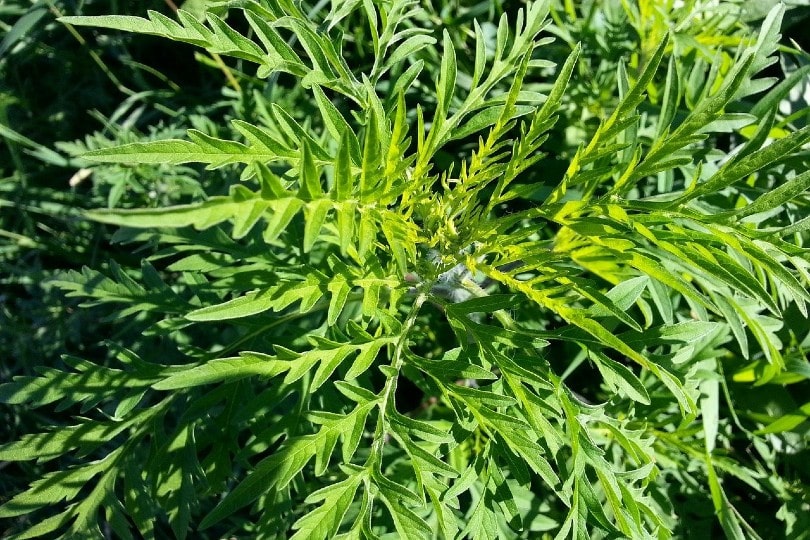
Not everyone has problems with the same types of weeds. Of course, a lot of this is affected by your location. Different regions have different plants that take root in yards. The weeds you have are probably different from the ones they have a few states over. Plus, weeds can differ over a few hundred feet as well. The weeds on one side of the hill are probably not the same as those on the other.
Weed killers can typically kill a variety of weeds. However, that does not mean that they can kill all weeds. You’ll need to consider which weeds you want to kill and find a formula designed for those weeds. Otherwise, the weed killer may not work at all.
Once again, there is usually a list or a description on the product’s bottle. For instance, many of them are designed for broadleaf weeds, which are a whole category of weeds. Others will have a more specific list.
Longevity
Some weed killers only work for a month or so. They effectively kill all the weeds in your yard, but they do not continue to kill weeds. Often, this is the case with spot-treating herbicides. They’re designed to kill the plant they’re sprayed on and then harmlessly dissipate. These weed killers do not prevent more weeds from returning.
Most herbicides are designed to be applied to the whole lawn work for 3–6 months. Usually, you’ll have to reapply the formula in the spring and fall. Most do not work if it is too hot, so using them in the summer is not recommended.
If you want to kill weeds on a fence line, you may only need a spot treatment. However, if you’re looking to prevent weeds from returning, you’ll want a longer-lasting option.
Types of Weed Killer
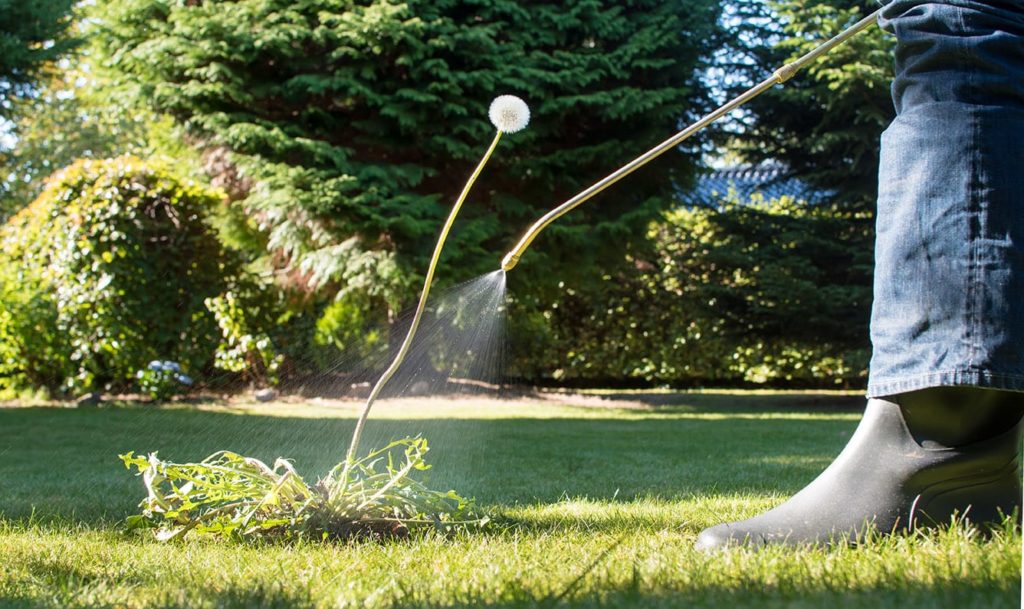
There are several types of weed killers out there. You don’t always need to know about the different types to choose an effective option (and not all options are blatant in what type they are). However, it does help to understand the available types so that you can choose the best option for your lawn.
Pre- or post-emergent
This category defines when a weed killer is meant to kill the weeds. Some are designed to kill the weed after it has emerged from the ground. In other words, it kills the weeds you can see during its active growing season. However, if the herbicide doesn’t make contact with the plant’s leaves, it does not work.
Other weed killers are pre-emergent, which means they target seedlings before emerging from the ground. These work best before the weed’s growing season and are commonly used in the fall.
Systemic or topical
Topical herbicides only kill the areas in which they are applied. Even if you are very diligent in where you apply the weed killer, this often misses the root. Some weeds may re-grow from the root in this case. On the other hand, systemic weed killers destroy the whole plant, including the root.
Selective or non-selective
The weed killers on this list are selective. In other words, they only target certain plants. They are safe on grass for this reason. However, non-selective weed killers destroy any plant they come into contact with, including your grass and other plants nearby. If you want to protect your grass, be sure that you use a selective weed killer.
Persistent or non-persistent
Many quality weed killers stay active for some time. This helps prevent future weeds, and the weed killer will destroy any seedlings that take root while it is active.
However, non-persistent options do not have any long-term effects. They work on the plants they touch when they touch them, but beyond that, they will not prevent future weeds from sprouting. Usually, these weed killers are only used when you need to kill specific plants, as it is not practical to reapply them constantly.
Conclusion
There are surprisingly few weed killers out there that do not also target your grass. Luckily, we were able to find seven options that seem to work for most situations, though it depends on a few variables. Out of all these weed killers, our favorite was the Ortho WeedClear Weed Killer for Lawns. It is safe for most types of grass and eliminates most weeds. Plus, it is generally pretty easy to apply and becomes rainproof after a short period.
If you’re looking for a cheaper option, you can try Roundup for Lawns. It targets most types of weeds and becomes rainproof after an hour. Plus, it is relatively easy for the average DIYer to use.
Featured Image Credit: Dean Clarke, Shutterstock
Contents


